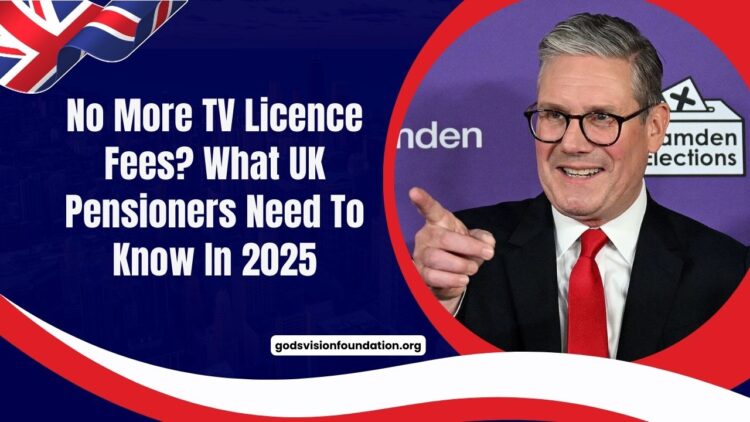For many pensioners in the UK, the television is more than just a form of entertainment—it is a lifeline that provides news, companionship, and a sense of connection. With the rising cost of living, every household expense counts, and the annual TV licence fee has become a significant burden for many older people living on fixed incomes.
Now, in 2025, discussions around a free TV licence scheme for pensioners have returned to the spotlight. While some celebrate the idea, others remain unsure of the details. The big questions are: Who qualifies? When will it start? And will it truly be free for all pensioners?
A Brief History of Free TV Licences for Pensioners
| Period | Policy |
|---|---|
| 2000 – 2019 | Pensioners aged 75+ received a free licence, funded by the government. |
| 2019 onwards | The government stopped direct funding and passed responsibility to the BBC. |
| 2020 – 2024 | Free licences limited only to pensioners aged 75+ claiming Pension Credit. |
| 2025 discussions | Renewed calls to extend free licences again to all pensioners aged 75+, regardless of income. |
This change in 2020 left many older people without free access, even though they struggled financially.
Why the Free TV Licence Debate Returned in 2025
Rising inflation, energy bills, and food costs have made recent years particularly difficult for pensioners. Campaigners and charities argue that TV is not a luxury—it’s a necessity. In early 2025, public pressure reignited the debate, with calls for the government to reinstate universal free TV licences for all pensioners over 75.
Current Eligibility for a Free Licence
At present, only pensioners who are aged 75 or over and receiving Pension Credit are entitled to a free TV licence.
However, this creates challenges:
- Around 850,000 pensioners eligible for Pension Credit do not claim it.
- Many who need financial help are excluded from the free licence scheme.
This gap has left thousands of vulnerable pensioners still paying the fee.
How Much Could Pensioners Save?
The annual licence fee of £174.50 may not sound large, but for those living on a basic State Pension of around £221.20 per week (about £11,500 per year), it’s a significant saving.
This money could instead cover:
- A month’s worth of electricity or gas bills.
- Several weeks of grocery shopping.
- Medical, mobility, or personal care expenses.
For pensioners managing tight budgets, every pound matters.
Government vs BBC: Who Pays?
A key issue is who should fund the free TV licence scheme.
- The government previously covered the cost, but stopped in 2019.
- The BBC argues that paying for universal free licences would cost more than £700 million annually, leading to potential cuts in programming and services.
This ongoing dispute has left pensioners in uncertainty, waiting for a clear decision.
Why TV Access Matters for Older People
For millions of pensioners:
- TV is their main source of news and information.
- Over 40% of pensioners live alone, and TV reduces feelings of loneliness.
- During crises such as the COVID-19 pandemic, television provided vital updates on safety and health.
In short, access to TV is about much more than entertainment—it is about well-being and social inclusion.
Possible Alternatives Being Considered
While universal free licences are being debated, other proposals include:
- Discounted licences for those aged 65+.
- Means-tested models tied to pension levels.
- Regional pilot schemes to test affordability before nationwide rollout.
Final details remain under discussion, but the hope is that 2025 will deliver clarity and fairness for pensioners.
How Pensioners Can Apply for a Free Licence
Currently, pensioners over 75 receiving Pension Credit can apply for a free licence:
- Check eligibility – ensure you meet the age and Pension Credit requirements.
- Apply online or by post – through the TV Licensing service.
- Provide proof – such as age and benefit entitlement.
- Receive confirmation – once approved, no further payments are required.
If the universal scheme goes ahead, this process may be simplified.
The debate over free TV licences for pensioners highlights broader issues of dignity, fairness, and social responsibility. While the £174.50 annual fee may seem minor to some, it can make a world of difference for pensioners struggling with rising living costs.
As the government and BBC continue discussions in 2025, the hope is for a fair solution that ensures older citizens—who have contributed all their lives—can continue to enjoy access to television without financial stress.
For now, pensioners should stay informed, check their eligibility, and prepare for possible changes that could finally bring free TV licences back for all.
FAQs
Who qualifies for a free TV licence in 2025?
Only those aged 75 or above who are claiming Pension Credit currently qualify, though discussions for wider eligibility are ongoing.
How much is the TV licence fee in 2025?
The cost is £174.50 per year for a colour TV licence. Pensioners who qualify for exemptions save this entire amount.
Will all pensioners get a free licence in 2025?
Not yet. The proposal is under discussion, but as of now, only pensioners over 75 on Pension Credit receive free licence.

